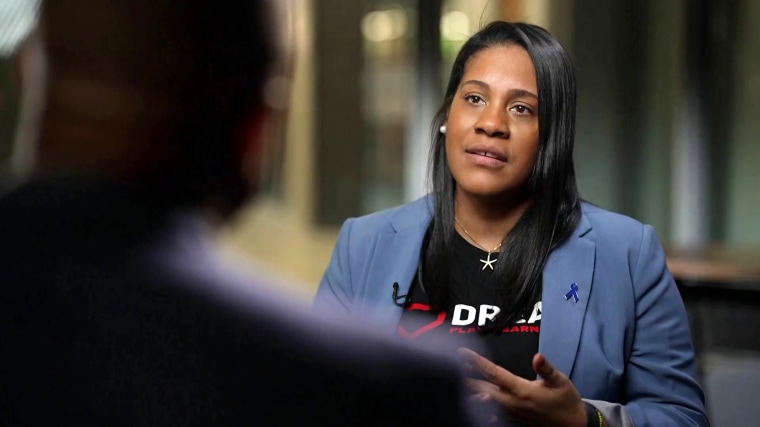Teaching kindergarten is exhausting. But when Mariely Del Valle started napping every day after work early last year, she knew something was off.
“I would immediately get home at 4:30-ish and take a nap from 5 to 7 p.m., which wasn’t the norm,” Del Valle, 41, told TODAY’s Craig Melvin in a segment aired March 8. In the evenings, when Del Valle would wake up from her nap, all she could manage was a shower before heading to bed again. Still, she never felt rested.
Around the same time, Del Valle noticed she was becoming sensitive to certain foods. “I was getting bloated” she said. “When I would eat certain things, it would mess up my stomach.” Soon after, she noticed a difference in her bowel movements and blood in her stool. She cut out certain foods, but "it wasn't helping at all," she said.
When Del Valle consulted her doctor, he recommended an endoscopy and a colonoscopy, even though she wasn’t yet 45, the recommended age for screenings.
“So, I scheduled this colonoscopy,” Del Valle said. “But I canceled it three times because I was scared.” She initially scheduled the procedure for April, didn’t show, rescheduled it for May, didn’t show, and then scheduled it again for June, when she finally went.
At age 40, Del Valle was diagnosed with colorectal cancer. There was a golf-ball-sized tumor in her colon, which had already metastasized to her liver. When she heard the news, "I got really hot throughout my body. My knees started, to hurt immediately. My first words were, 'I have a son.' And then I said, 'I don’t want to die.'"
After five rounds of chemotherapy to shrink the tumor, Del Valle had surgery to remove it, along with two pieces of her liver and a portion of her colon.
“I can’t believe I was diagnosed with cancer at 40,” Del Valle says. “I’m still young. I have a whole life in front of me.”

Colon cancer affecting younger ages
Colon cancer has been rising for years in people under 50, but especially in those in their 20s and 30s, Dr. Andrea Cercek, gastrointestinal oncologist at Memorial Sloane Kettering, said on TODAY.
While more people are getting screened for colon cancer, which can lead to more diagnoses, Cercek believes they're something else at play, though it's not clear what. People leading more sedentary lifestyles and rising obesity rates could be a factor, she said, as could something in the environment or in our diets.
“There is something that’s changed that’s affecting people much younger, and that’s causing them to develop colon cancer much younger than they used to,” she said.
Young people are also less likely to seek treatment when they have symptoms of colon cancer, and doctors may be less likely to consider colon cancer as a possible diagnosis in these patients.
"Many young people dismiss their symptoms. They’re busy with their lives (and) put off that doctor’s visit," Cercek said. "And really unfortunately, sometimes providers don’t think colon cancer as a first diagnosis in someone who has change in bowel habits or rectal bleeding."
"Oftentimes, young people actually have to see several providers before they get diagnosed, so that really, we think, explains the fact that we’re seeing these cases much more advanced, stage 4, as opposed to earlier stages," she added.
Colon cancer symptoms typically include:
- Bloody stool
- Changing bowel habits
- Unexplained abdominal pain
- Unexplained weight loss
- Unexplained fatigue
Data released in 2024 by the American Cancer society named colorectal cancer as the top cause of cancer deaths in men under 50 and the second-leading cause of cancer deaths for women under 50 after breast cancer.
“Cancer patients are increasingly shifting from older to middle‐aged individuals who have many more years of life expectancy,” the study authors noted.
The recommended age for a colonoscopy is 45 years old. Dr. Ahmedin Jemal, senior vice president of surveillance and health equity science at the American Cancer Society, called for an increase in screening for people between 45 and 49, TODAY.com previously reported, especially for those with a genetic predisposition for colon cancer.
If you have a family history of colon cancer, inflammatory bowel disease or are concerned about your risk for colon cancer, talk to your doctor.
Raising awareness of colon cancer
Del Valle is now undergoing preventative chemo to ensure the cancer doesn’t come back. She's grateful for the treatments she's received.
"It could’ve gone left real quick. And if I kept canceling that appointment, I don’t know where would I be right now," she said. "I never thought that I would get cancer at age 40 or cancer ever. ... Anyone can get cancer."
"Those first couple months (after the diagnosis) were terrible," Del Valle continued. "But now I feel like I’m seeing the light at the end of the tunnel. And I have this chance to open my mouth, advocate, and tell people, 'Oh, you’re 35? You have stomach issues? Get a screening. Get a colonoscopy. You’re 40? Get a colonoscopy.'"